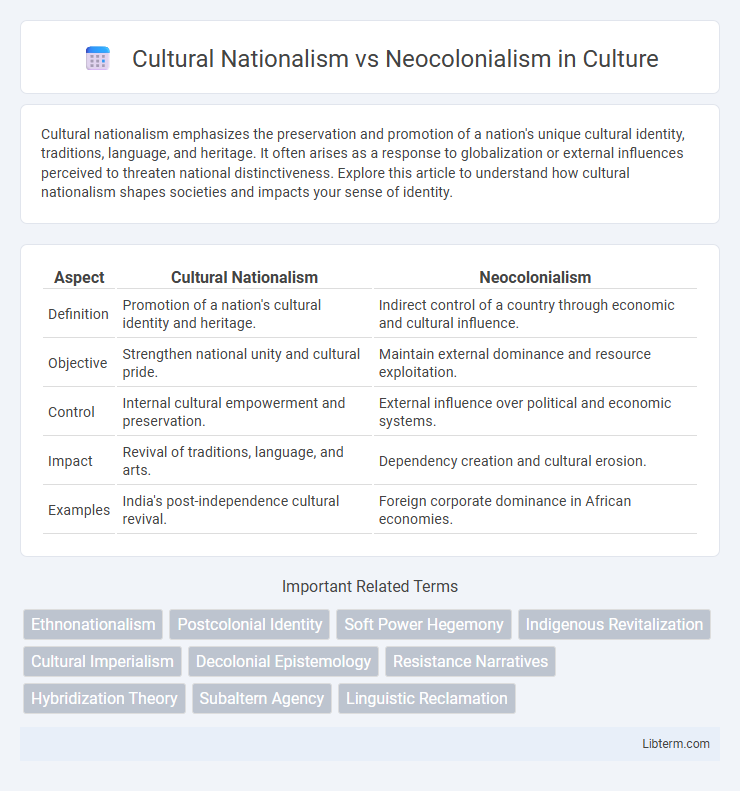Cultural nationalism emphasizes the preservation and promotion of a nation's unique cultural identity, traditions, language, and heritage. It often arises as a response to globalization or external influences perceived to threaten national distinctiveness. Explore this article to understand how cultural nationalism shapes societies and impacts your sense of identity.
Table of Comparison
| Aspect | Cultural Nationalism | Neocolonialism |
|---|---|---|
| Definition | Promotion of a nation's cultural identity and heritage. | Indirect control of a country through economic and cultural influence. |
| Objective | Strengthen national unity and cultural pride. | Maintain external dominance and resource exploitation. |
| Control | Internal cultural empowerment and preservation. | External influence over political and economic systems. |
| Impact | Revival of traditions, language, and arts. | Dependency creation and cultural erosion. |
| Examples | India's post-independence cultural revival. | Foreign corporate dominance in African economies. |
Understanding Cultural Nationalism: Definition and Origins
Cultural nationalism emphasizes the preservation and promotion of a nation's unique cultural identity, often rooted in language, traditions, and historical narratives. Originating in the 19th century during the rise of nation-states, it served as a response to colonial domination and cultural erosion by asserting indigenous values and heritage. This form of nationalism contrasts with neocolonialism, which involves indirect control and economic exploitation by former colonial powers through cultural and political influence rather than direct governance.
Neocolonialism Explained: Modern Mechanisms of Influence
Neocolonialism refers to the modern mechanisms through which powerful nations exert control over developing countries, often via economic, political, and cultural pressures rather than direct military occupation. Multinational corporations, international financial institutions, and trade agreements frequently serve as instruments of neocolonial influence, undermining local sovereignty and perpetuating dependency. This indirect domination contrasts with cultural nationalism, which emphasizes the protection and revival of indigenous cultural identity against external domination.
Historical Context: Colonialism’s Legacy in National Identity
Colonialism's legacy deeply influenced cultural nationalism by reshaping national identities through imposed foreign values and suppression of indigenous traditions. The struggle for cultural nationalism emerged as a response to neocolonialism, which perpetuated economic and political dependency despite formal political independence. Historical contexts reveal that colonial powers deliberately crafted identities to control colonized populations, fueling movements that sought to reclaim and redefine authentic national culture against such external dominance.
Key Differences Between Cultural Nationalism and Neocolonialism
Cultural nationalism emphasizes the preservation and promotion of a nation's unique cultural identity, language, and traditions to foster unity and resist external cultural influences. Neocolonialism involves indirect control or influence by a dominant country over a less powerful nation, often through economic, political, or cultural pressures that undermine sovereignty. The key difference lies in cultural nationalism's pursuit of self-determination and cultural revival, while neocolonialism perpetuates external domination and dependency under the guise of modernization or aid.
Cultural Preservation vs. Cultural Domination
Cultural nationalism emphasizes the preservation and revitalization of indigenous traditions, languages, and identities to resist external cultural imposition and maintain sovereignty. Neocolonialism manifests through cultural domination by imposing foreign values, media, and education systems that erode local customs and reinforce dependency. This tension highlights the struggle between safeguarding cultural heritage and resisting subtle forms of cultural imperialism embedded within global power structures.
The Role of Language in National Identity and Neocolonial Control
Language serves as a powerful symbol of cultural nationalism, reinforcing national identity by preserving indigenous traditions, history, and collective memory. Neocolonialism often exploits linguistic dominance by imposing foreign languages to control knowledge, limit local expression, and maintain socio-political influence. This linguistic control shapes power dynamics, restricting cultural sovereignty and perpetuating economic dependency in post-colonial societies.
Economic Dimensions: Indigenous Autonomy vs. External Dependence
Cultural nationalism emphasizes indigenous economic autonomy through local resource control, traditional industries, and community-based trade systems, fostering self-sufficiency and resistance to foreign economic dominance. Neocolonialism, conversely, perpetuates external dependence via multinational corporations, exploitative trade agreements, and foreign direct investment that often benefit external powers at the expense of local economies. This dynamic underlines the tension between preserving economic sovereignty and the structural constraints imposed by global capitalist integration.
Globalization: A Catalyst for Neocolonialism or National Revival?
Globalization acts as a double-edged sword, simultaneously enabling cultural nationalism by promoting national identity and heritage, while also accelerating neocolonialism through economic dependency and cultural homogenization. Multinational corporations and international financial institutions often exert influence that undermines local sovereignty, perpetuating neocolonial structures under the guise of global integration. Conversely, some nations leverage global platforms to revive and assert their unique cultural identities, demonstrating that globalization can facilitate national revival alongside neocolonial challenges.
Contemporary Case Studies: Cultural Resistance and Neocolonial Challenges
Contemporary case studies highlight how cultural nationalism serves as a powerful form of resistance against neocolonial challenges by reclaiming indigenous identities and promoting local traditions in countries like India and Nigeria. Efforts to revive native languages, traditional art forms, and historical narratives oppose the cultural homogenization driven by global corporate and political interests. These movements underscore the tension between preserving cultural sovereignty and the pervasive influence of neocolonial economic and cultural policies.
Toward Cultural Sovereignty: Strategies for Nations in the 21st Century
Cultural nationalism emphasizes the protection and promotion of indigenous languages, traditions, and customs as essential elements of national identity, resisting neocolonial influences that undermine cultural autonomy. Strategies for achieving cultural sovereignty in the 21st century include implementing educational reforms prioritizing native histories, supporting local media productions, and enforcing policies that limit foreign cultural dominance in media and commerce. Nations increasingly leverage digital platforms to revitalize endangered cultures and assert control over their cultural narratives, countering economic and political pressures linked to neocolonialism.
Cultural Nationalism Infographic

 libterm.com
libterm.com